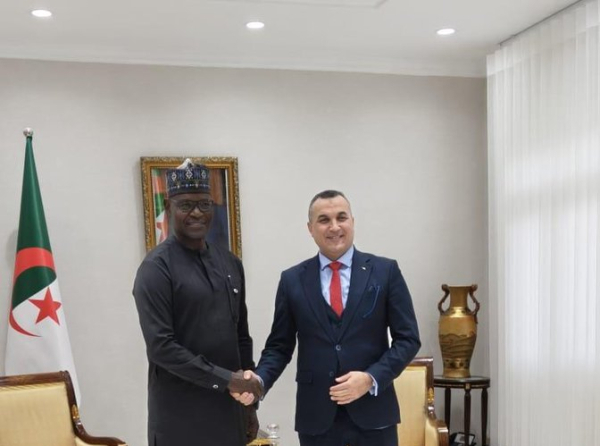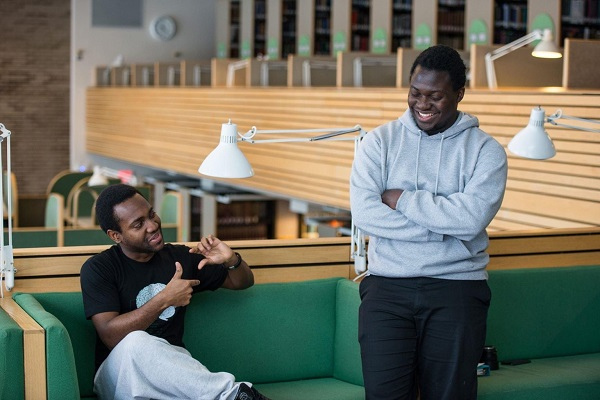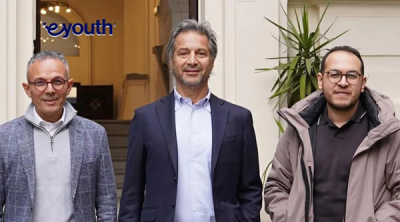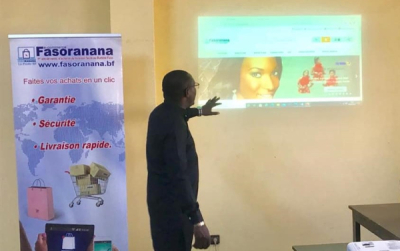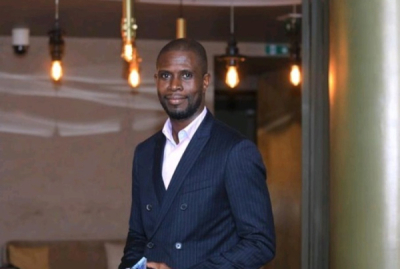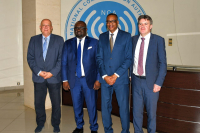Algeria will host the African Digital Transformation Summit this March 28-30. Preparations are already in full swing following a meeting between the Secretary-General of the ATU and Algerian Minister Sid Ali Zerrouki at the 2026 Algeria Optical Summit. The summit aims to turn high-level discussions into measurable actions that drive the continent’s digital transition and attract sustainable investment.
Chipper Cash is officially operating in the black. The African payments specialist reported that it covered all operating expenses in Q4 2025, successfully halting its cash burn after two years of restructuring. By doubling down on key markets like Nigeria and Uganda and leveraging the success of its dollar-denominated cards, Chipper Cash is now signaling that its business model is built to last.
eYouth, the Egyptian edtech company, has entered the Iraqi market through a partnership with Al-Majal Group. Together, they are launching Iraq’s first Arabic digital learning platform, designed to boost employability through career-focused training and international-standard certifications for young professionals and graduates.
- Congolese engineer Elie Yossa founded Findapp to centralize access to local products, services, and events.
- Launched in 2023, the mobile application targets residents and visitors by aggregating fragmented local information.
- The platform offers local businesses a low-complexity visibility tool to reach nearby consumers.
Elie Yossa is a Congolese engineer specializing in electronics and software engineering. He founded Findapp and serves as the application’s product lead. The mobile platform promotes local life by making a city’s products, services, events, and initiatives visible to residents and visitors.
Launched in 2023, Findapp positions itself as a clear and accessible showcase of local activity. The application allows users to quickly identify what they can do, buy, or experience nearby by centralizing information that often remains scattered across multiple channels or social networks.
Through the application, users access featured products, available services, ongoing events, and local initiatives in their city. The platform aims to deliver readable and useful information about nearby offerings within seconds.
For local shops and organizations, Findapp serves as a visibility tool targeting city residents. The platform enables businesses to promote products, services, or events without managing complex or multi-channel communication strategies.
As a result, local actors can increase brand awareness at the city level and reach audiences that traditional channels may not capture. The application creates a shared digital space where each contribution supports local activity while generating tangible benefits for users.
Alongside Findapp, Elie Yossa serves as chief technology officer at Jambo-Lab, a platform specializing in climate technologies. In 2023, he co-founded Agri Pannel Connect, an agri-tech solution designed to improve yields, strengthen climate resilience, and support sustainable agriculture. In the same year, he also founded Kivu Guard, an initiative aimed at protecting vulnerable communities in eastern Democratic Republic of Congo from armed violence and insecurity.
Elie Yossa graduated from the Higher Institute of Computer Science and Management of the Democratic Republic of Congo. He also won the 2025 Global Youth Action Fund award, which organizers launched during the International Baccalaureate Festival of Hope.
This article was initially published in French by Melchior Koba
Adapted in English by Ange Jason Quenum
- La Poste Burkina Faso launched Fasoranana in 2019 as part of its digital transformation strategy.
- The platform integrates e-commerce, payment, and nationwide delivery through the postal network.
- Fasoranana supports local merchants while expanding access to online retail in Burkina Faso.
La Poste Burkina Faso developed Fasoranana as an online commerce platform. The postal operator designed the solution to allow users to buy and sell goods easily. The platform, launched in 2019, forms part of the operator’s broader strategy to embed digital services into its core postal activities.
Fasoranana operates through a mobile application available on Android. The application has already recorded more than one hundred downloads, according to the Play Store.
On the platform, customers browse hundreds of products through smartphones or web browsers. Users select items, manage orders, and complete secure payments via mobile money, bank cards, or cash on delivery. Meanwhile, La Poste Burkina Faso ensures delivery through its national postal network, which leverages its logistics and distribution expertise.
Fasoranana aims to recreate the physical market experience in a digital environment. The platform reduces travel constraints and improves purchasing convenience for Burkinabe consumers. At the same time, the initiative allows local merchants to expand online operations, reach new customers, and increase visibility without facing traditional barriers linked to physical retail.
By broadening access to e-commerce, Fasoranana contributes to the modernization of Burkina Faso’s retail sector. In addition, the platform capitalizes on existing postal infrastructure to deliver an integrated solution covering sales, payments, and last-mile delivery.
This article was initially published in French by Adoni Conrad Quenum
Adapted in English by Ange Jason Quenum
-
Stéphane Lavri co-founded Madata in 2024 to centralize data and operations for African SMEs.
-
Madata provides web and mobile tools to manage sales, clients, invoices, projects, and payments in one platform.
-
The solution targets freelancers and SMEs and supports real-time collaboration and financial monitoring.
Amid persistent management challenges facing small and medium-sized enterprises, Stéphane Lavri chose to develop a tool adapted to on-the-ground realities. His innovation aims to turn company data into actionable insights.
Stéphane Lavri, an Ivorian entrepreneur and consultant, co-founded Madata, a digital solution dedicated to supporting small and medium-sized enterprises in managing information systems, data, and digital transformation.
Founded in 2024, Madata operates as an online application designed to help African entrepreneurs and SMEs structure and monitor daily operations from a computer or mobile phone. The platform centralizes sales, customers, invoices, projects, and payments in a single environment and provides simple and secure access to company data at any time.
Available on both web and mobile versions, Madata primarily targets freelancers and SMEs. The application groups essential management functions within one interface, including customer tracking, quotations, contracts, invoices, purchase orders, projects, payments, and daily activities. In addition, the platform allows users to manage financial flows, analyze cash inflows and outflows, and obtain a clear view of business health to support fast and informed decision-making.
The solution also improves collaborative work. Users can share professional documents directly through WhatsApp. Companies can organize teams, plan assignments, and allocate tasks, which strengthens internal coordination and supports the fulfillment of client commitments. The platform updates data in real time, allowing all collaborators to work on the same information regardless of location.
Before launching Madata, Stéphane Lavri co-founded DIGIT-A.L., a digital consulting firm, where he served as co-managing director until 2024. He holds a master’s degree in international trade obtained in 2006 from Jean Moulin University Lyon 3 in France.
Lavri began his professional career in 2007 at international IT company Umanis, where he worked as a business engineer. In 2008, he joined Belgian technology firm Adneom in the same role before securing a promotion in 2011 as head of the commercial unit. In 2014, he took charge of the commercial unit at IT consulting and services company AUSY.
This article was initially published in French by Melchior Koba
Adapted in English by Ange Jason Quenum
-
South Sudan created a national committee to supervise gateway services and data center operations.
-
Internet penetration reached 15.7%, with about 1.9 million users in early 2025.
-
The regulator partnered with Switzerland’s mgi communications ag to modernize governance and revenue flows.
At the beginning of 2025, South Sudan counted about 1.9 million internet subscribers, representing a penetration rate of 15.7%, according to DataReportal. The figures highlighted both rising connectivity and the structural limits of the country’s digital ecosystem.
Against this backdrop, South Sudanese authorities last week officially established a Supervisory Committee for Gateway Services and the National Data Center. The government assigned the committee a mandate to strengthen governance, accountability, and institutional control over these critical infrastructures.
The National Communications Authority (NCA) created the committee with technical support from Swiss firm mgi communications ag (MGI). The regulator tasked the body with digitizing revenue flows from South Sudan’s International Gateway (SSIGW) to improve transparency and efficiency.
At the same time, the committee aims to modernize digital infrastructure to accelerate national digital transformation. Authorities also instructed the committee to ensure that all operations strictly protect national sovereignty and security interests.
Officials view the initiative as a structural step to secure strategic digital infrastructure while laying the foundation for stronger regulatory oversight and long-term sector growth.
This article was initially published in French by Isaac K. Kassouwi
Adapted in English by Ange Jason Quenum
The Aurora Tech Award has announced the 30 finalists for its 2026 edition, highlighting an all-female cohort of startup founders. Selected from 3,400 applicants across 127 countries, these entrepreneurs represent the surge of female-led innovation in technology. Spanning sectors from AI and fintech to healthtech and edtech, the finalists will receive strategic and financial support ahead of the global awards ceremony later this year.
Israeli IT services firm Commit has acquired Savannah, a startup that recruits senior developers across Africa. Founded in 2022, Savannah has placed more than 100 engineers at global companies. The deal, worth several million dollars, marks Commit’s entry into Africa’s fast-growing tech talent market, as traditional outsourcing costs rise.
Kenyan digital lender MyCredit has raised $3 million in debt funding from an international microfinance institution. The round brings the company’s total funding raised to $13.6 million. The funds will be used to scale lending for SMEs, private schools, and individual entrepreneurs. Noblestride Capital advised on the deal. MyCredit said it aims to expand access to credit for underbanked borrowers in Kenya.
More...
The 2026 RegTech Africa Conference, scheduled for May 20–22, will host a regional qualifying round of the Startup World Cup in Abuja. The event will give African startups a platform to pitch their solutions to investors and policymakers. The winner will advance to the global final for a chance to secure a $1 million investment and boost its international visibility.
The 2026 Albert Schweitzer International Prize, with a total prize fund of €50,000, supports healthcare projects in Sub-Saharan Africa. Three winners will receive €25,000, €15,000 and €10,000, respectively, to implement practical solutions to improve healthcare access and quality within 12 months. Applications are open until February 6, 2026, through the Dutch fund’s online portal.
The Ministry of Post and Telecommunications has launched the Insat online portal to receive complaints, inquiries and suggestions from the public about postal and telecom services. The platform offers a simple, secure and transparent way to submit and track requests, with faster processing times.
-
Mauritania’s digital ministry launched a public portal disclosing procurement and spending data.
-
The platform publishes all expenditures since the government took office in August 2024.
-
The ministry more than doubled its 2026 budget to nearly $24.2 million.
Mauritania’s Ministry of Digital Transformation unveiled the platform on Sunday, January 18, in Nouakchott. The initiative supports the government’s push to modernize public administration and strengthen financial transparency.
Accessible to the public at transparence.mtnima.gov.mr, the portal allows users to consult all expenditures committed by the ministry since the formation of the current government on August 7, 2024. The platform covers contracts awarded by the Public Procurement Commission as well as those concluded by internal purchasing committees, including projects and agencies under the ministry’s supervision.
The portal provides detailed data on signed and ongoing contracts, including contract values, selected suppliers, the number of bids received, and procurement methods used. The ministry updates the information continuously to support real-time monitoring of budget execution.
The platform also includes an advanced search engine that allows users to filter data by contracting authority, contract type, procurement stage, and funding source. A statistical section presents interactive tables and charts, offering a clearer view of spending structures and their distribution by category or supplier.
The launch comes as the Ministry of Digital Transformation manages growing budgetary resources. For fiscal year 2026, the government set the ministry’s budget at 959.6 million ouguiyas, or about $24.2 million. The allocation represents a 104.6% increase from 2025, when the budget stood at 468.97 million ouguiyas, following 550.68 million ouguiyas in 2024.
Authorities said the disclosure aims to promote fairer competition among economic operators by ensuring equal access to public procurement information. Media organizations, civil society groups, and researchers can use the database to assess public policies and monitor state financial management. The portal is free to access, available in Arabic and French, and requires no registration.
This article was initially published in French by Samira Njoya
Adapted in English by Ange Jason Quenum


